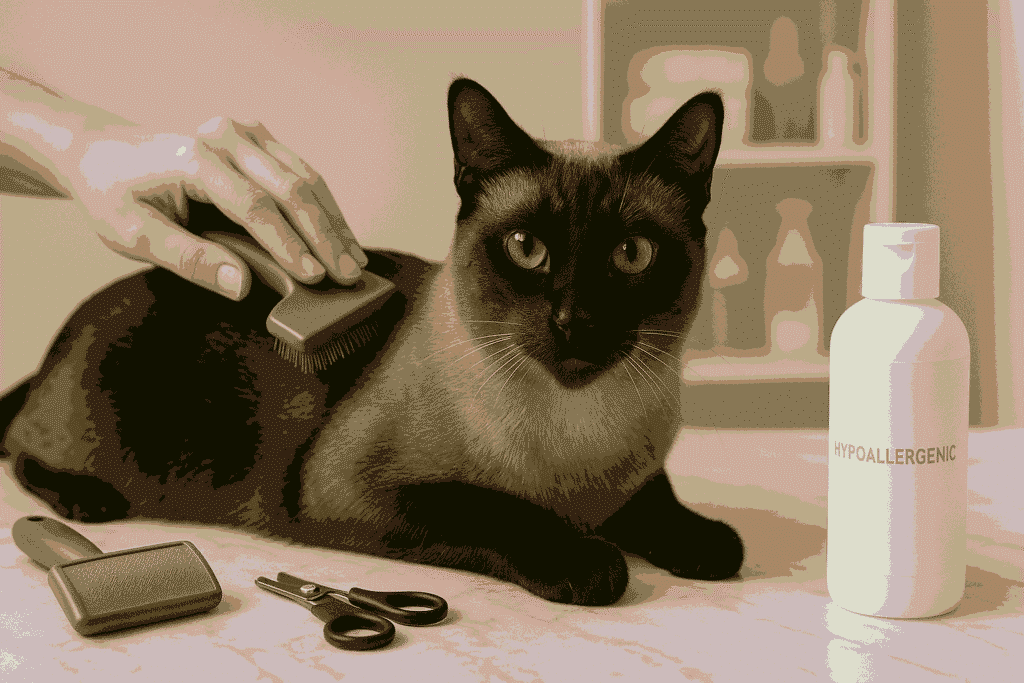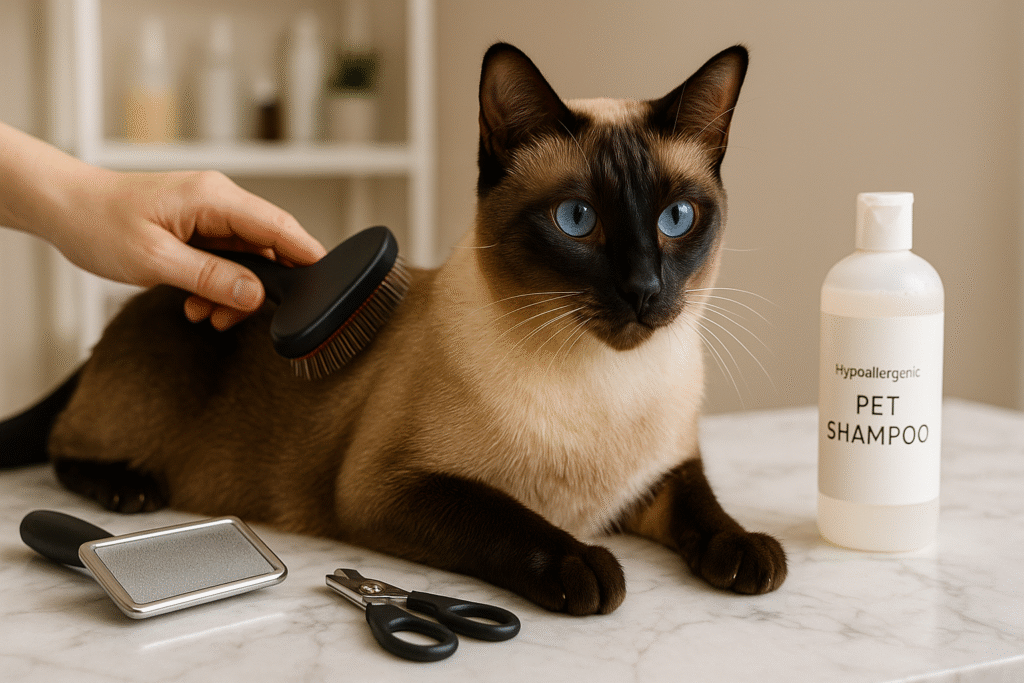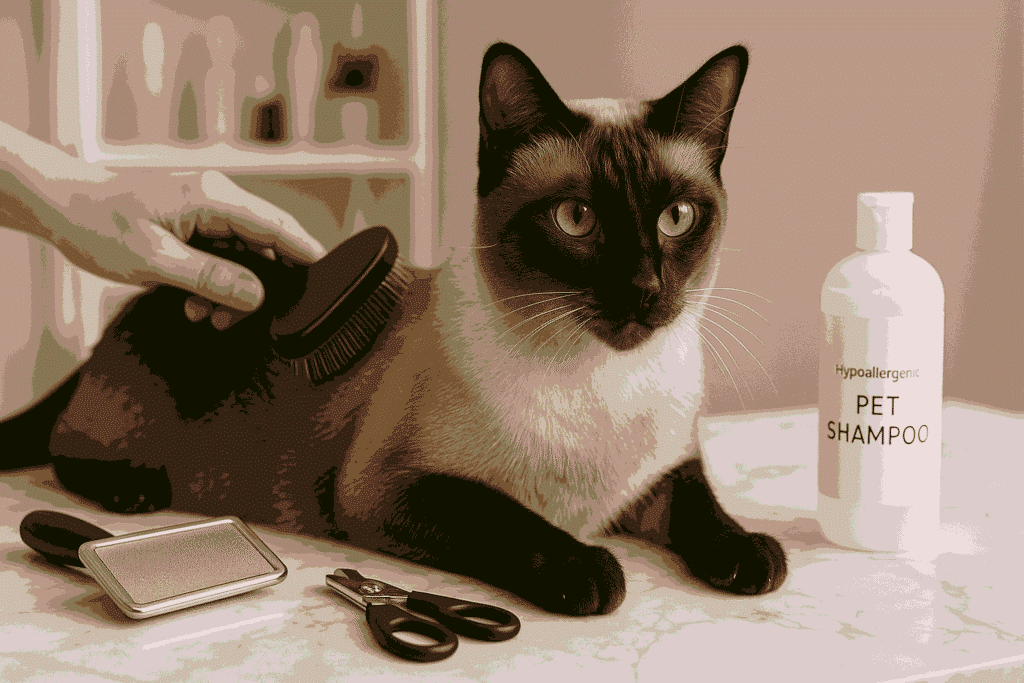Siamese cats are one of the most recognizable and affectionate cat breeds, known for their blue eyes, slender bodies, and lively personalities. But like every purebred cat, they have certain health concerns that owners should know about. From genetic disorders to respiratory and dental issues, understanding Siamese cat health issues helps you care for them better and keep them healthy for years.
Many Siamese cats face breed-specific problems such as progressive retinal atrophy, heart disease, and kidney complications. They are also prone to behavioral issues and can develop conditions like asthma or gastrointestinal disorders. Knowing the symptoms early makes a huge difference in treatment and quality of life. Preventive care, regular vet visits, and a balanced diet can reduce most health risks and ensure your cat lives a long, happy life.
This article will guide you through every aspect of Siamese cat health—common illnesses, genetic risks, behavioral patterns, and preventive care. You’ll also learn how to identify serious conditions like cancer, manage aging symptoms, and maintain your cat’s emotional and physical well-being.
key Hillights:
-
Common health issues include respiratory, dental, and kidney diseases.
-
Genetic disorders like PRA and HCM are common in Siamese cats.
-
Lifespan varies between 12–20 years, depending on care and environment.
-
Behavioral issues like aggression or excessive meowing may signal health concerns.
-
Preventive care, a healthy diet, and regular vet checkups are essential.
-
Early detection of diseases such as cancer can save lives.
-
Indoor living often extends lifespan compared to outdoor cats.
-
Genetic testing helps prevent hereditary illnesses.
-
Environmental enrichment supports both mental and physical health.
-
FAQs cover practical tips for daily care and long-term management.
Siamese Cat Health Issues: A Complete Guide for Owners
Siamese cats are among the most beautiful and intelligent cat breeds. Their striking blue eyes, sleek body, and affectionate nature make them popular pets worldwide. However, like all breeds, Siamese cats are prone to specific health issues that owners should understand. Knowing about these problems helps ensure your cat lives a long, happy, and healthy life.
Siamese cats have unique genetics that can make them vulnerable to respiratory, dental, and hereditary conditions. Awareness of these issues allows you to take preventive steps, identify early warning signs, and seek timely veterinary care. Understanding their behavioral and genetic predispositions is equally essential for overall well-being.
This article provides a complete overview of Siamese cat health issues, covering common illnesses, genetic disorders, behavioral concerns, lifespan, preventive care, and answers to frequently asked questions. By the end, you’ll be well-equipped to maintain your Siamese cat’s health with confidence.
Key Takeaways:
-
Common health problems in Siamese cats include respiratory, dental, and gastrointestinal disorders.
-
Genetic testing can help detect hereditary conditions early.
-
Proper preventive care extends lifespan and improves quality of life.
-
Behavioral management is crucial alongside physical health care.
-
Knowledge of warning signs for serious illnesses like cancer is essential.
Common Health Issues in Siamese Cats
Siamese cats are prone to several breed-specific health issues. Owners often report respiratory problems, dental disease, gastrointestinal disorders, and heart or kidney complications. Early recognition is crucial for effective treatment.
-
Respiratory infections are common in Siamese cats due to their narrow nasal passages.
-
Dental problems, including periodontal disease, can cause discomfort and poor appetite.
-
Gastrointestinal issues, such as IBS or food allergies, lead to vomiting or diarrhea.
-
Heart diseases like hypertrophic cardiomyopathy (HCM) are genetic and require monitoring.
-
Kidney disease is more likely in older cats, affecting hydration and appetite.
Summary: Recognizing these common health issues early helps in timely treatment and prevents complications.
Genetic Disorders in Siamese Cats
Siamese cats can inherit certain conditions that impact their lifespan and quality of life. Genetic testing and screening are essential tools for prevention.
-
Progressive Retinal Atrophy (PRA): Leads to vision loss over time.
-
Hypertrophic Cardiomyopathy (HCM): Causes heart enlargement and can be fatal if untreated.
-
Amyloidosis: Protein deposits affecting organs like the kidneys and liver.
-
Genetic testing is recommended before breeding to avoid passing conditions to kittens.
-
Early detection improves treatment outcomes and prolongs lifespan.
Summary: Genetic disorders can be mitigated with proper testing and monitoring, ensuring a healthier life for your Siamese cat.
Lifespan and Aging in Siamese Cats
Siamese cats are generally long-lived, often reaching 12–20 years with proper care. Lifespan varies depending on genetics, diet, and environment.
-
Indoor cats usually live longer than outdoor cats due to reduced risks.
-
Blue Siamese cats may show slight differences in health patterns compared to other variants.
-
Regular veterinary check-ups help identify age-related issues like kidney disease.
-
Maintaining a balanced diet and proper hydration supports longevity.
-
Behavioral and mental stimulation contributes to overall health.
Summary: Awareness of aging patterns and preventive measures can help your Siamese cat enjoy a long, healthy life.
Behavioral Health Concerns
Behavior often reflects underlying health problems. Siamese cats are intelligent and social but may develop personality or behavioral issues if their needs are unmet.
-
Excessive meowing can indicate stress or discomfort.
-
Aggression toward other cats may stem from territorial instincts or health issues.
-
Biting, especially in the morning, can be linked to energy levels or dental discomfort.
-
Anxiety and hyperactivity may signal neurological or environmental issues.
-
Behavioral enrichment and proper attention reduce stress and improve quality of life.
Summary: Understanding behavioral health is essential for interpreting physical health signals and maintaining harmony.
Preventive Care and Health Management
Preventive care is critical to minimizing health issues and extending lifespan in Siamese cats. Routine check-ups and proper home care can prevent many serious conditions.
-
Regular veterinary visits, at least annually, help detect early health problems.
-
Vaccinations protect against common infectious diseases.
-
Dental care, including brushing and cleanings, prevents oral disease.
-
Nutritionally balanced diets support organ function and overall well-being.
-
Environmental enrichment and mental stimulation improve both physical and behavioral health.
Summary: A proactive approach to preventive care is key to ensuring your Siamese cat remains healthy and happy.
Signs of Serious Illnesses, Including Cancer
Siamese cats may develop serious conditions like cancer, which require careful monitoring and timely intervention.
-
Early signs include lethargy, appetite loss, vomiting, or unusual lumps.
-
Intestinal cancer or mouth cancer often shows symptoms late, emphasizing regular exams.
-
Monitoring behavior, weight, and activity levels helps detect early warning signs.
-
Stage 4 conditions require veterinary guidance for treatment or euthanasia decisions.
-
Knowledge of survival rates and treatment options helps owners make informed decisions.
Summary: Vigilance and timely veterinary intervention can improve outcomes for serious illnesses, including cancer.
Common Health Issues in Siamese Cats
| Health Issue | Symptoms | Prevention/Treatment |
|---|---|---|
| Respiratory Problems | Sneezing, nasal discharge, coughing | Vaccination, clean environment |
| Dental Disease | Bad breath, gum inflammation | Regular dental care, professional cleanings |
| Gastrointestinal Disorders | Vomiting, diarrhea, weight loss | Diet management, vet consultation |
| Heart Disease (HCM) | Lethargy, difficulty breathing | Regular vet check-ups, medication |
| Kidney Disease | Frequent urination, thirst | Early diagnosis, dietary support |
Behavioral Concerns and Management
| Behavior | Possible Cause | Management |
|---|---|---|
| Excessive meowing | Stress, boredom | Playtime, attention, environment enrichment |
| Aggression toward cats | Territorial instincts | Gradual socialization, behavioral training |
| Morning biting | Energy bursts, dental discomfort | Toys, structured play, dental check |
| Anxiety | Environmental changes | Safe spaces, consistent routine |
| Hyperactivity | Lack of stimulation | Mental games, interactive toys |
FAQs
What are the most common health issues in Siamese cats?
Respiratory infections, dental disease, gastrointestinal disorders, heart and kidney problems.
How can I prevent dental disease in my Siamese cat?
Brush teeth regularly, provide dental treats, and schedule professional cleanings.
What are the signs of kidney disease in Siamese cats?
Increased thirst, frequent urination, weight loss, and lethargy.
How do I manage my Siamese cat’s asthma?
Avoid triggers, use prescribed medication, and monitor breathing.
At what age do Siamese cats develop health problems?
Some genetic conditions appear early, while chronic illnesses are more common in senior cats.
Are there any genetic tests available for Siamese cats?
Yes, testing for PRA, HCM, and amyloidosis is available to detect hereditary conditions.
How can I tell if my Siamese cat is in pain?
Signs include hiding, decreased appetite, lethargy, vocalization, or unusual aggression.
What should I do if my Siamese cat is excessively vocal?
Assess for health issues, provide stimulation, and ensure social interaction.
Is it safe to let my Siamese cat go outdoors?
Outdoor exposure increases risks of accidents and disease; supervision is recommended.
How can I help my aging Siamese cat stay healthy?
Routine vet visits, proper diet, mental stimulation, and monitoring for age-related conditions.
Conclusion
Understanding Siamese cat health issues is the first step toward giving your feline friend a longer, happier, and more comfortable life. While this breed can be prone to certain genetic, respiratory, and behavioral problems, most of these conditions can be managed—or even prevented—with the right care. Regular veterinary checkups, a balanced diet, mental stimulation, and early detection of symptoms all play a key role in maintaining your Siamese cat’s overall well-being.
As a responsible owner, staying informed about your cat’s unique health risks helps you act quickly and confidently when needed. Whether it’s recognizing early signs of illness, managing aging concerns, or understanding behavioral changes, your awareness can make all the difference.



